Xibin Wu
Laminar: A Scalable Asynchronous RL Post-Training Framework
Oct 14, 2025Abstract:Reinforcement learning (RL) post-training for Large Language Models (LLMs) is now scaling to large clusters and running for extended durations to enhance model reasoning performance. However, the scalability of existing RL frameworks is limited, as extreme long-tail skewness in RL trajectory generation causes severe GPU underutilization. Current asynchronous RL systems attempt to mitigate this, but they rely on global weight synchronization between the actor and all rollouts, which creates a rigid model update schedule. This global synchronization is ill-suited for the highly skewed and evolving distribution of trajectory generation latency in RL training, crippling training efficiency. Our key insight is that efficient scaling requires breaking this lockstep through trajectory-level asynchrony, which generates and consumes each trajectory independently. We propose Laminar, a scalable and robust RL post-training system built on a fully decoupled architecture. First, we replace global updates with a tier of relay workers acting as a distributed parameter service. This enables asynchronous and fine-grained weight synchronization, allowing rollouts to pull the latest weight anytime without stalling the actor's training loop. Second, a dynamic repack mechanism consolidates long-tail trajectories onto a few dedicated rollouts, maximizing generation throughput. The fully decoupled design also isolates failures, ensuring robustness for long-running jobs. Our evaluation on a 1024-GPU cluster shows that Laminar achieves up to 5.48$\times$ training throughput speedup over state-of-the-art systems, while reducing model convergence time.
HybridFlow: A Flexible and Efficient RLHF Framework
Sep 28, 2024



Abstract:Reinforcement Learning from Human Feedback (RLHF) is widely used in Large Language Model (LLM) alignment. Traditional RL can be modeled as a dataflow, where each node represents computation of a neural network (NN) and each edge denotes data dependencies between the NNs. RLHF complicates the dataflow by expanding each node into a distributed LLM training or generation program, and each edge into a many-to-many multicast. Traditional RL frameworks execute the dataflow using a single controller to instruct both intra-node computation and inter-node communication, which can be inefficient in RLHF due to large control dispatch overhead for distributed intra-node computation. Existing RLHF systems adopt a multi-controller paradigm, which can be inflexible due to nesting distributed computation and data communication. We propose HybridFlow, which combines single-controller and multi-controller paradigms in a hybrid manner to enable flexible representation and efficient execution of the RLHF dataflow. We carefully design a set of hierarchical APIs that decouple and encapsulate computation and data dependencies in the complex RLHF dataflow, allowing efficient operation orchestration to implement RLHF algorithms and flexible mapping of the computation onto various devices. We further design a 3D-HybridEngine for efficient actor model resharding between training and generation phases, with zero memory redundancy and significantly reduced communication overhead. Our experimental results demonstrate 1.53$\times$~20.57$\times$ throughput improvement when running various RLHF algorithms using HybridFlow, as compared with state-of-the-art baselines. HybridFlow source code is available at https://github.com/volcengine/verl.
OpenRLHF: An Easy-to-use, Scalable and High-performance RLHF Framework
May 20, 2024



Abstract:As large language models (LLMs) continue to grow by scaling laws, reinforcement learning from human feedback (RLHF) has gained significant attention due to its outstanding performance. However, unlike pretraining or fine-tuning a single model, scaling reinforcement learning from human feedback (RLHF) for training large language models poses coordination challenges across four models. We present OpenRLHF, an open-source framework enabling efficient RLHF scaling. Unlike existing RLHF frameworks that co-locate four models on the same GPUs, OpenRLHF re-designs scheduling for the models beyond 70B parameters using Ray, vLLM, and DeepSpeed, leveraging improved resource utilization and diverse training approaches. Integrating seamlessly with Hugging Face, OpenRLHF provides an out-of-the-box solution with optimized algorithms and launch scripts, which ensures user-friendliness. OpenRLHF implements RLHF, DPO, rejection sampling, and other alignment techniques. Empowering state-of-the-art LLM development, OpenRLHF's code is available at https://github.com/OpenLLMAI/OpenRLHF.
S3ML: A Secure Serving System for Machine Learning Inference
Oct 13, 2020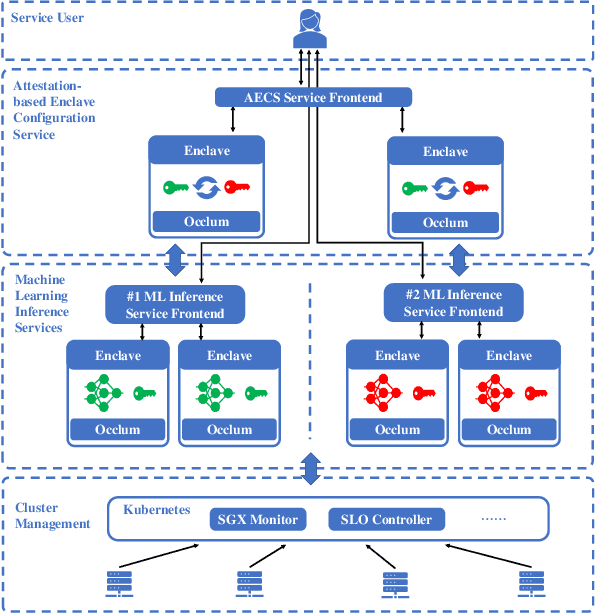
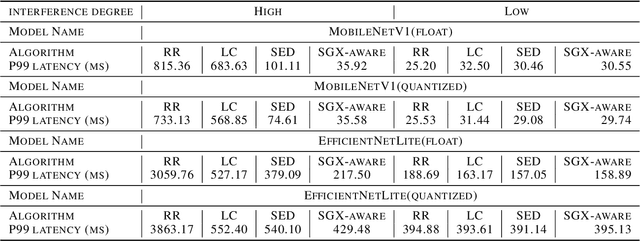
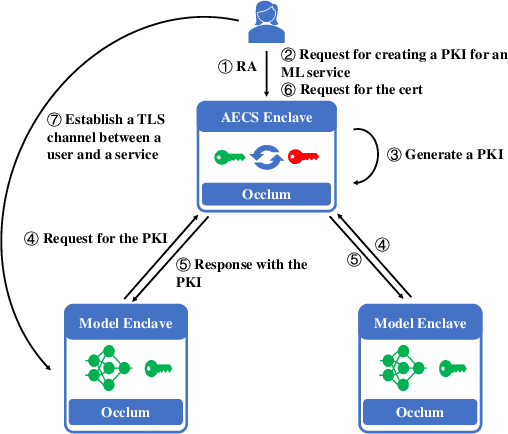
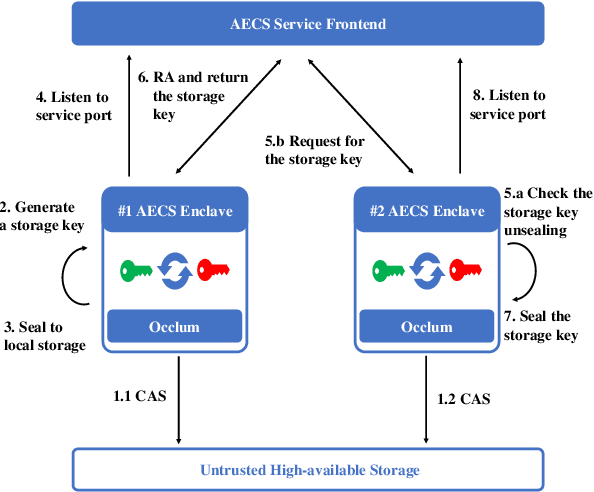
Abstract:We present S3ML, a secure serving system for machine learning inference in this paper. S3ML runs machine learning models in Intel SGX enclaves to protect users' privacy. S3ML designs a secure key management service to construct flexible privacy-preserving server clusters and proposes novel SGX-aware load balancing and scaling methods to satisfy users' Service-Level Objectives. We have implemented S3ML based on Kubernetes as a low-overhead, high-available, and scalable system. We demonstrate the system performance and effectiveness of S3ML through extensive experiments on a series of widely-used models.
When Homomorphic Encryption Marries Secret Sharing: Secure Large-Scale Sparse Logistic Regression and Applications in Risk Control
Aug 20, 2020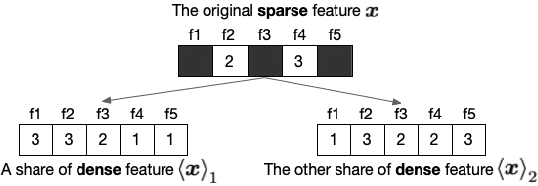

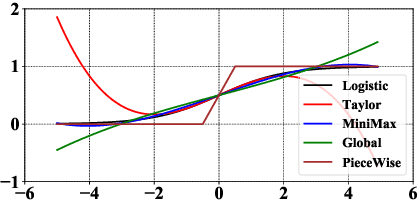
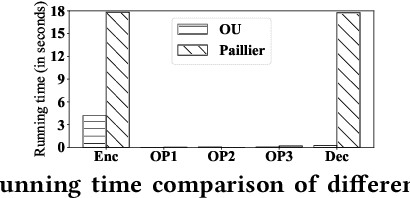
Abstract:Logistic Regression (LR) is the most widely used machine learning model in industry due to its efficiency, robustness, and interpretability. Meanwhile, with the problem of data isolation and the requirement of high model performance, building secure and efficient LR model for multi-parties becomes a hot topic for both academia and industry. Existing works mainly employ either Homomorphic Encryption (HE) or Secret Sharing (SS) to build secure LR. HE based methods can deal with high-dimensional sparse features, but they may suffer potential security risk. In contrast, SS based methods have provable security but they have efficiency issue under high-dimensional sparse features. In this paper, we first present CAESAR, which combines HE and SS to build seCure lArge-scalE SpArse logistic Regression model and thus has the advantages of both efficiency and security. We then present the distributed implementation of CAESAR for scalability requirement. We finally deploy CAESAR into a risk control task and conduct comprehensive experiments to study the efficiency of CAESAR.
Industrial Scale Privacy Preserving Deep Neural Network
Mar 12, 2020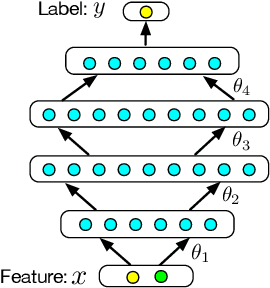
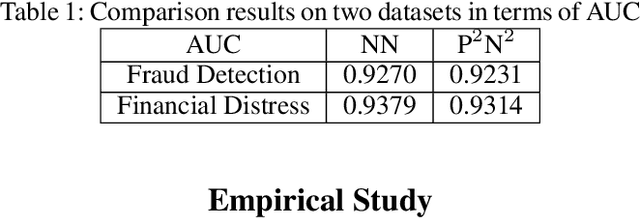
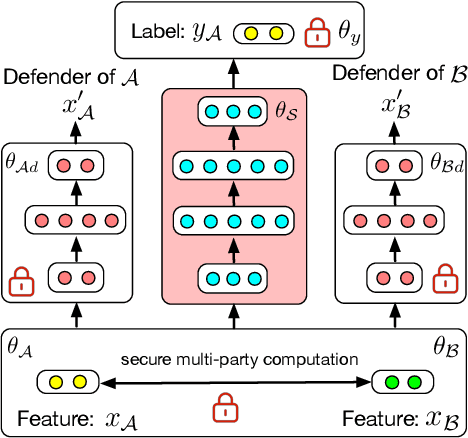
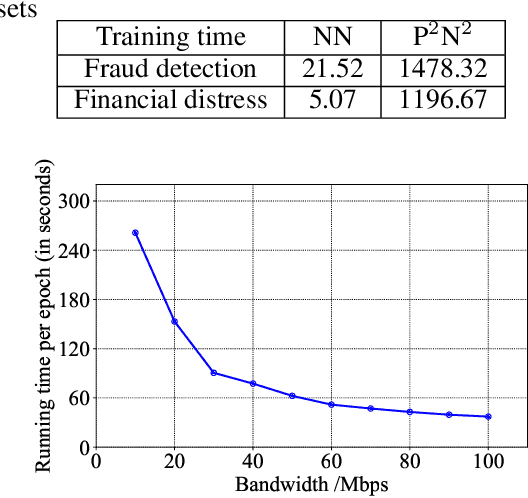
Abstract:Deep Neural Network (DNN) has been showing great potential in kinds of real-world applications such as fraud detection and distress prediction. Meanwhile, data isolation has become a serious problem currently, i.e., different parties cannot share data with each other. To solve this issue, most research leverages cryptographic techniques to train secure DNN models for multi-parties without compromising their private data. Although such methods have strong security guarantee, they are difficult to scale to deep networks and large datasets due to its high communication and computation complexities. To solve the scalability of the existing secure Deep Neural Network (DNN) in data isolation scenarios, in this paper, we propose an industrial scale privacy preserving neural network learning paradigm, which is secure against semi-honest adversaries. Our main idea is to split the computation graph of DNN into two parts, i.e., the computations related to private data are performed by each party using cryptographic techniques, and the rest computations are done by a neutral server with high computation ability. We also present a defender mechanism for further privacy protection. We conduct experiments on real-world fraud detection dataset and financial distress prediction dataset, the encouraging results demonstrate the practicalness of our proposal.
 Add to Chrome
Add to Chrome Add to Firefox
Add to Firefox Add to Edge
Add to Edge